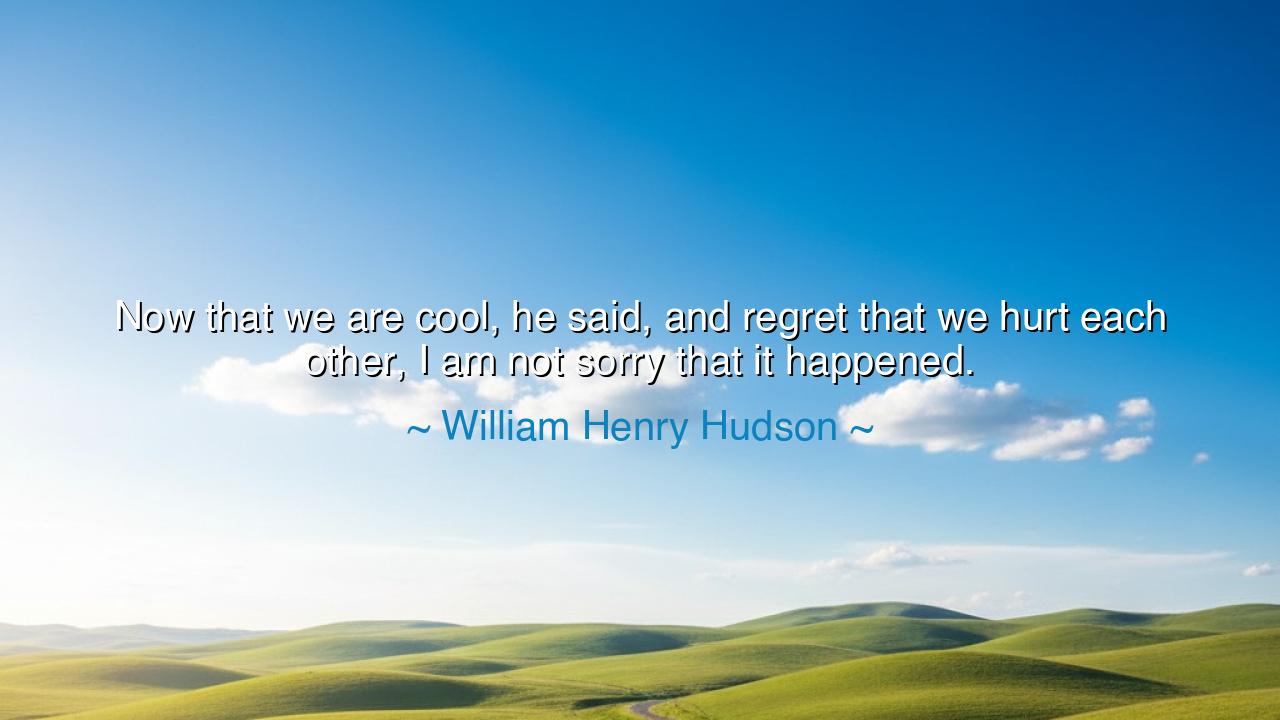
Now that we are cool, he said, and regret that we hurt each
Now that we are cool, he said, and regret that we hurt each other, I am not sorry that it happened.






In the vast landscape of human relationships, there is an inevitable truth that arises from the friction between souls—the deep lessons that are often borne from pain and conflict. William Henry Hudson’s words, "Now that we are cool, he said, and regret that we hurt each other, I am not sorry that it happened," carry within them a profound understanding of the transformative power of struggle. The quote speaks to the complexity of human emotions and relationships, revealing that while we may regret the hurt we cause, there is an inherent value in the experiences that shape us. To Hudson, the experience of pain, when transcended, becomes an integral part of growth—something that, despite its bitterness, ultimately serves a higher purpose.
In the ancient world, the greatest philosophers and warriors often spoke of the duality of life—the beauty that comes from growth and the inevitable suffering that accompanies it. Socrates, the great Greek philosopher, recognized that true wisdom comes not from avoiding hardship, but from embracing it and learning from it. He famously said, “The unexamined life is not worth living,” implying that it is through the examination of our experiences, both painful and joyous, that we discover meaning. Hudson's words echo this timeless wisdom: the pain of hurt and conflict, though regrettable, can often lead us to deeper understanding and, ultimately, a stronger connection with others.
The Greek tragedy of Oedipus Rex, penned by Sophocles, is an example of how suffering leads to self-realization. Oedipus, upon learning the truth of his actions and their devastating consequences, is overcome with grief and regret. Yet, his suffering leads to a profound self-awareness, one that allows him to understand the limits of human knowledge and control. In this tragedy, as in Hudson's reflection, suffering is not an end in itself but a catalyst for growth and self-discovery. The regret Oedipus feels is an acknowledgment of the past, but it also serves as the foundation for the lessons he—and the audience—learn from his downfall.
Similarly, in the Roman world, the philosopher Seneca often wrote about the necessity of adversity in shaping a person’s character. In his work, “On the Shortness of Life,” Seneca teaches that our misfortunes are not to be mourned, but rather embraced, for they offer the opportunity to cultivate virtue and wisdom. He believed that true growth comes not from living in comfort, but from the trials that push us beyond our limits. Hudson's reflection is aligned with this thinking: although the pain of hurting others may bring sorrow, the wisdom and strength that follow make the experience invaluable. In this way, regret is not an end but a beginning—a starting point for greater understanding.
Consider the real-life story of Nelson Mandela, whose struggle against apartheid in South Africa was fraught with personal and collective suffering. Mandela, imprisoned for 27 years, endured untold hardships, yet he emerged from prison not with anger or vengeance, but with a commitment to reconciliation and forgiveness. In his autobiography, he writes of the regret he felt for the pain caused by the conflict, but he also recognized that this suffering was an essential part of the process that led to freedom and justice for his people. Mandela’s ability to transform his suffering into a force for change echoes the sentiment in Hudson's words: though regret is natural, it does not diminish the value of the journey we have traveled.
The lesson in Hudson's quote is one of acceptance and transformation. It teaches us that life is not about avoiding conflict or pain, but about learning from it. Regret, though powerful, should not paralyze us; instead, it should be viewed as a tool for growth. Just as Socrates, Seneca, and Mandela turned their struggles into stepping stones toward wisdom and justice, so too must we embrace the challenges and the hurts that come our way. They are the grist for the mill of personal development, shaping us into more empathetic, understanding, and resilient individuals.
In our own lives, we must learn to face the hurts we cause or experience, not with shame or regret alone, but with the courage to learn from them. Just as Hudson acknowledged the pain of hurt, he also recognized the value of transcendence. We must take responsibility for the wounds we cause and use the lessons to heal ourselves and others. The key is not to avoid suffering, but to understand it as a natural part of life’s complex journey. In doing so, we will find that the deepest connections and the most meaningful transformations come from the times when we move through hurt and emerge stronger, wiser, and more connected to the world around us.
Thus, let us embrace the inevitability of human conflict and suffering, knowing that it is through such experiences that we are shaped into better versions of ourselves. Just as Hudson suggests, the pain we feel in moments of regret is not the end of our story, but a gateway to greater understanding and wisdom. In the end, the journey itself—fraught with mistakes, pain, and regret—is what enables us to create something greater: a life filled with meaning, compassion, and growth.






AAdministratorAdministrator
Welcome, honored guests. Please leave a comment, we will respond soon